DEANS Q&A
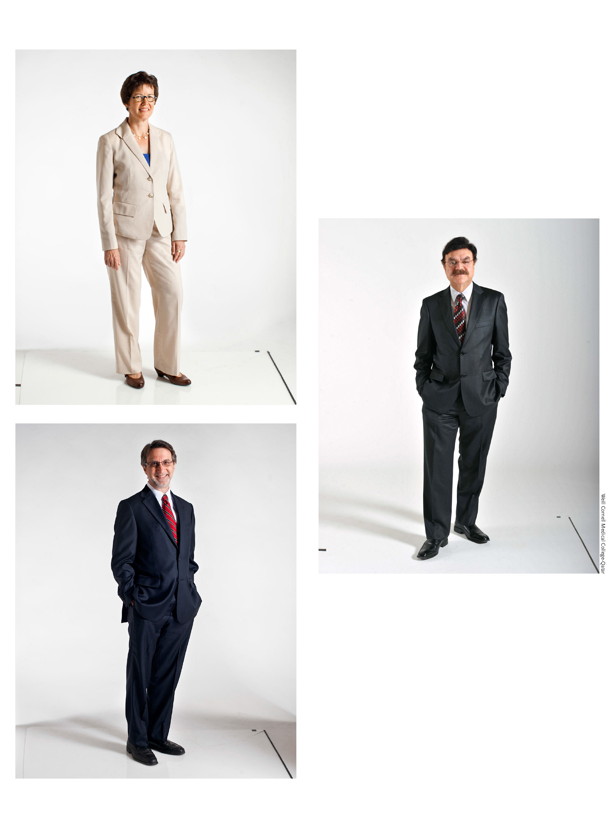
Q&A with Cornell's deans On Eureka! moments, the noblest profession and mind melds in computing
In this, Ezra's fourth installment in an ongoing series of conversations with the academic deans of Cornell's colleges and schools, we delve into the roles of social sciences and the humanities in the College of Arts and Sciences, ways to bridge the distance from Qatar to New York City and Ithaca, and increasing enrollments in computer science.
Hear from two brand-new deans, and one who is halfway around the globe, on answers to questions like: What does an alumna, now dean of her former college, find different about it three decades later? What is Cornell's medical college in Qatar doing to affect public health in the Middle East? How will Cornell maintain its place in the top tier of computer science universities?
Haym Hirsh
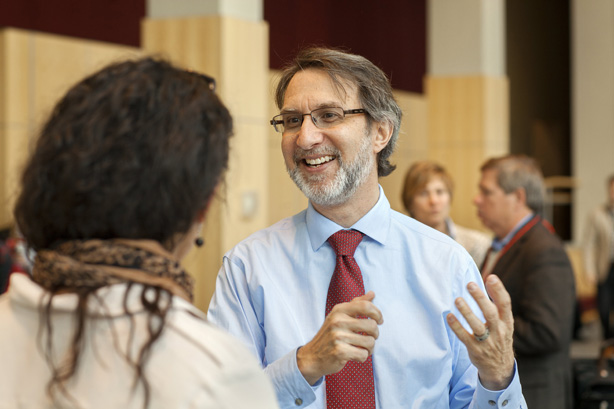
Haym Hirsh, dean of the Faculty of Computing and Information Science, chats with Cornellians at Trustee-Council Annual Meeting events in October.
What were your first impressions of CIS?
My first experience with CIS far predates my arrival at Cornell. In 1999 Cornell created CIS to make computing and information sciences "organizationally promiscuous," placing it in its own college-level unit to respond effectively to the transformative impact that computing was having in all sectors of life and learning. CIS is now Cornell's vibrant home for research and education in the three core disciplines of the information economy: computer science, which studies the capabilities and the fundamental limits of computers and computation; information science, which looks at the interactions between people and technology; and statistical science, which focuses on processes for reasoning about and understanding data and uncertainty.
My first impressions of CIS were as an admirer witnessing these changes over the years. Rather ironically, as an academic leader at Rutgers I had often used Cornell as a model for how Rutgers could similarly empower its computing and information sciences, at least until Cornell came knocking. In the span of a few months I went from being a kid looking in the window of a candy store to a kid inside the store.
Were there any surprises?
With each day at Cornell I discover new surprises. For example, I was surprised to learn that over a third of CIS's faculty have joint appointments with other departments, that two CIS faculty (and five alums!) have received science and technology Academy Awards, that information science managed to hire four new faculty in a single year this last year, and that the CS faculty have lunch together every day. I enjoyed learning that in 1891 Cornell faculty member Walter Wilcox assumed the first professorship in statistics in the U.S. and served as president of the American Statistical Association, a position later held by Edmund Ezra Day, Cornell's fifth president. Finally, I was very pleased to discover that CIS graduates have played key roles in some of the most visible enterprises, including Microsoft Office and Windows, Google's search group, and Facebook's News Feed engineering team.
What do you want to do that will be new?
Cornell is among the world's top institutions in computing and information sciences and accomplishes this with a faculty size far smaller than its peers. For example, we are in the top five in CS and have managed to do that with roughly half as many faculty as the other four. Even within this group we are overachievers, with four of our senior CS faculty elected to both the National Academy of Sciences and the National Academy of Engineering and five of our youngest faculty receiving Microsoft Faculty Fellowships – a combination matched by no one else among the top five.
One might say that thus far CIS has done more with less. What I'd like to do that's new is to do more with more. I would like to grow CIS in size while maintaining our sharp eye for recruiting the most elite faculty in the world. CIS needs this growth to serve our massively increasing student demand – undergraduate enrollments in computer science have more than doubled in five years; to continue to be a hub for collaboration and innovation across Cornell; and to develop pillars of strength that target some of the most societally important challenges of our times.
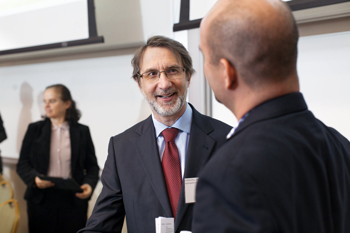
Haym Hirsh, dean of the Faculty of Computing and Information Science, chats with Cornellians at Trustee-Council Annual Meeting events in October. See larger image
How important is Gates Hall, the building you move into this January?
Bill and Melinda Gates Hall is a game changer for CIS, consolidating our faculty and modernizing our facilities. Gates Hall brings together for the first time all our CS and IS faculty into one location, which will simplify research collaboration and allow us to expand and strengthen the educational experience that we provide our students. It also gives us a new, modern, forward-looking space that can be responsive to the changing face of computing. Gates Hall will be a signature building for Cornell and an icon for CIS and what it has to offer in the years ahead.
Tell us about your own research.
My research sits at the intersection of computing and information sciences, the two CIS departments that jointly hold my faculty appointment. For most of my career I've worked in the areas of machine learning, data mining and information retrieval, often applied to problems involving people and their use of computing. Most recently my research has turned to an area called "human computation," which brings a computer scientist's sensibilities about building reliable and efficient systems together with social science's understanding of people and behavior to think more expansively and holistically about the design of today's social computing systems.
One of my personal views is that as it goes on, computing repeatedly does "mind melds" with other fields. One of the deepest mind melds is, what is intelligence? Can we come up with a sufficient understanding of the brain that leads to the understanding of consciousness? Is consciousness necessary to have broadly capable intelligent systems?
What do you do outside of work?
I do a lot of pretty geeky things. I read science fiction, and I'm a big fan of mechanical puzzles. I have an absolute passion for and collect art objects made out of recycled materials. [On a shelf in his office is a locomotive made out of a trumpet, a sprinkler head, nails and random bits of metal.] There's a mathematical elegance to how their makers take a lot of seemingly random things and make something of surprising beauty. It appeals to the part of me that likes clever ideas; these craftspeople come out of left field to solve a problem in ways as unexpected and interesting to me as can be the case in the most important of research advances.
The deanHaym Hirsh, dean of the Faculty of Computing and Information Science (CIS) At Cornell since July 2013; recruited from Rutgers University, where he was professor and chair of computer science. Areas of expertise: Machine learning, artificial intelligence, human-computer interaction Faculty of Computing & Information SciencePopulation: 60 core faculty members, 482 declared undergraduate majors, 348 graduate students CIS is an interdisciplinary college-level unit created to recognize that computing enters into almost every academic discipline. More than 100 faculty from more than a dozen departments spanning five colleges and professional schools participate in its 10 graduate degree offerings. Its 7,000 undergraduate enrollments come from all colleges and professional schools; CIS's faculty offer six undergraduate majors spanning Cornell's three largest colleges and minors to students in all of Cornell's colleges and professional schools. Cornell Now campaign goal: $35 million; $20.1 million raised (as of October 2013) |
Gretchen Ritter '83
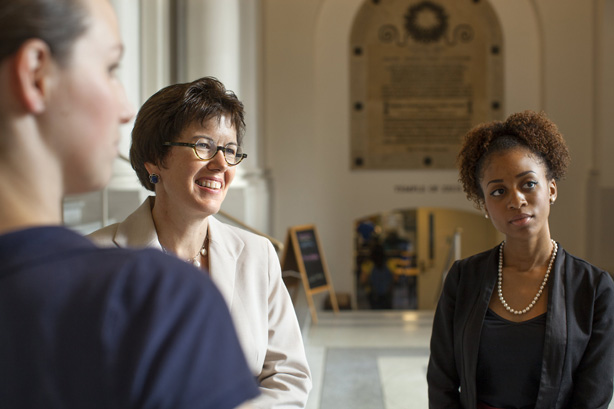
Gretchen Ritter '83, dean of the College of Arts and Sciences, chats with students, including Jennelle Gordn '15, right, graduate student Kate Seufer, left, and Aquillah White '15 (not pictured) in the foyer of Goldwin Smith Hall.
How has Cornell and the College of Arts and Sciences changed since you were an undergraduate?
Part of what's been surprising to me is how similar in many ways the college is to the way it was in the early '80s. It is still a place that is structured around excellent teachers, really impressive independent, on-their-own-path students, and a sense of academic community. I think that is part of what makes this a wonderful school.
You were a government major. Does this inform your leadership of the college?
I'm a political scientist; I think a lot about democracies, and I think a lot about organizational and institutional structures and how they change over time. Part of my belief and commitment to higher education is that it is very important for American democracy. I see it as an institution that contributes to good citizenship at the national and international levels, and I also see it as an institution that creates innovation – precisely because it is a place that is open to the talents of people from all backgrounds.
Which experiences from your more than two decades at the University of Texas at Austin are most relevant to your work as dean?
One is simply the role of being a faculty member, including the joys and the challenges of learning to be a good teacher. I enjoyed that a great deal, and found I was always seeking new ideas for how to do it more effectively. On the scholarship side, the "Eureka!" moments that come from being a researcher and feeling like you've stumbled onto a great idea, or a great finding, is something that I feel I share with all of my faculty colleagues in the college.
I was the head of the largest interdisciplinary center at UT-Austin for five years. I saw the importance of connecting people from different departments and the benefits that can come from bringing different disciplinary perspectives to the study of the same subject. It also instilled in me a commitment to faculty development, including mentoring junior faculty.
From my experience in the provost's office and working in undergraduate education, I bring an appreciation for the importance of information technology for education and research and the kinds of opportunities that this can create for us as well as some of the challenges it poses. … Technologies can really enhance what we do in helping us to connect to people in other parts of the globe and in allowing us to rethink how we use the classroom. We need to be open to those possibilities and to pursue them in ways that align with our core values – particularly a commitment to educational excellence and to putting students first.
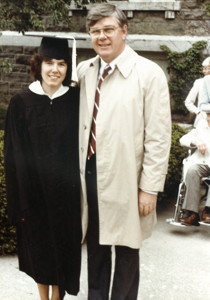
Ritter at her graduation from Cornell in 1983 with her father, David Ritter '59. See larger image
What are your priorities and vision for the College of Arts and Sciences?
My big goal is to move the college into the very top rank of liberal arts colleges internationally. What does it mean to be a great liberal arts college in the 21st century, given the challenges of information technology and increased global connection? What contributions can the college make to this new, more interconnected world? Whether those contributions are in terms of cultivating human understanding in a global age or preparing people for global citizenship, that is a role we should be playing.
In the social sciences, Cornell is quite diffuse; we have very good departments, but they suffer a bit from that diffusion. So helping to expand and strengthen key departments in the social sciences will be important to the well-being of the college. The social sciences are also significant because this is an area in which our college provides insights on key public issues – such as obesity, immigration and educational attainment.
How do you see the role of the humanities at Cornell and in the balance between science and the arts?
The humanities has always been one of the gems of Cornell – this is an area of strength that we should all take pride in. One of our strengths in the humanities is in area studies – we were one of the first universities in the U.S. to teach Mandarin, for instance. Cornell was a pioneer among American universities in taking a more outward view and in connecting American higher education to East Asia, for instance.
I also think that the "crisis in the humanities" which is being discussed in the press is quite exaggerated. There have been previous historical moments of economic anxiety, or anxiety over technological change, that have caused students to worry about their careers and their incomes. As a parent I am very appreciative of those anxieties, and I do think that we need to be mindful of that for our students and their families. But I would argue that a liberal arts education, including a strong foundation in the humanities, is in fact the education that best equips you for a changing world, the one that helps prepare you to deal with the diversity of human experience and social change, including change brought about by advances in the sciences. I also think it is an education that equips you to think critically by assessing what we know and how we know it. … the liberal arts have been a source of social innovation and economic innovation for our country.
You're a third-generation Cornellian?
Yes, my father, David Ritter, was a 1959 graduate of the Law School, and his stepmother, Ethel Corwin, was an Arts and Sciences graduate, Class of 1929. And I have hopes for a fourth generation.
What are your other interests?
I enjoy the natural world; I've been having a great time exploring trails and parks in the area; when I can I like to run and bike. One of the things that's a real joy for me about being back is that I have a lot of family in upstate New York and get to spend time with my parents, who live about three hours away in the Hudson Valley.
The deanGretchen Ritter '83, the Harold Tanner Dean of the College of Arts and Sciences At Cornell, and dean, since: 2013 Areas of expertise: American politics, democratic theory and constitutional development The College of Arts and SciencesPopulation: 600 faculty members, 4,100 undergraduates, 1,500 graduate students Areas of growth: A renewed commitment to strengthening core disciplines in the natural sciences and humanities, along with a deeper focus on strengthening the social sciences; growing international engagement in scholarship and education; and exploring new growth areas in environmental science and the mathematical/computational sciences. Endowment: $434.6 million (as of June 2013) Cornell Now campaign goal: $225 million; $163.8 million raised (as of September 2013) |
Javaid Sheikh
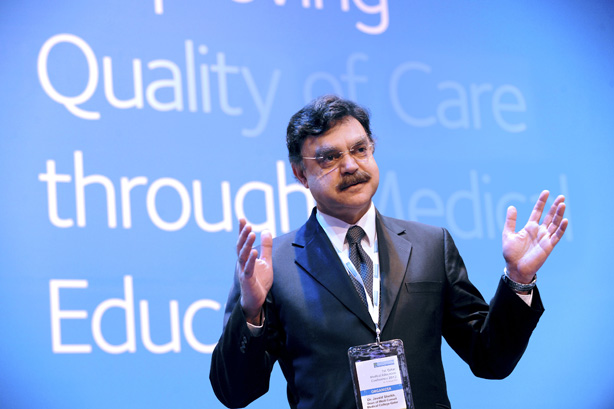
Javaid Sheikh, dean of Weill Cornell Medical College in Qatar, speaks at the World Health Care Conference in Abu Dhabi in 2010. Photo: Weill Cornell Medical College in Qatar.
What first drew you to medicine?
When I was growing up, medicine was universally acknowledged as the "noblest profession," as at its core was the concept of being a healer and helping those who are most vulnerable. While changing mores in society with a general increase in cynicism has put a dent in idealism for some, for me, it continues to be the noblest profession. I am inspired by the opportunity to contribute to the development of physician-scientists who possess today a deeper and broader understanding of disorders and are well-suited to the practice of personalized medicine, with access to diagnostic and therapeutic innovations.
What do you see as Weill Cornell Medical College in Qatar's areas for growth in the future?
There are many exciting avenues for growth open to us, and the most crucial of these is our partnership with Sidra Medical and Research Center, a state-of-the-art facility that will eventually become Qatar's flagship health care provider.
WCMC-Q faculty have been working closely with our partners at Sidra to offer the technical advice and expertise needed to create a facility able to provide excellence in health care and research. This relationship presents fantastic opportunities for our students, who will have the opportunity to gain practical experience on the wards of the new hospital, right across the road from the college. We envisage a relationship with Sidra based on joint research and a culture of shared learning that will benefit students, faculty members, researchers and patients, as well as the health of people in the country and the region. This free flow of ideas between the two institutions offers the most exciting potential for growth and development in the medical field anywhere in the Middle East.
Which achievements of the college are you most proud of?
Without a doubt, our proudest achievement is that we have produced a cadre of 147 new physicians since our inauguration in 2002. It has been a source of great pleasure and pride to have witnessed these young people meet and overcome the challenges of an extremely tough curriculum to realize their dreams of qualifying as doctors. These new doctors go on to work in hospitals and research facilities all over the world, and use their talents to improve the lives of others.
Another goal the college has strived toward since its inauguration has been to establish the same culture of excellence in teaching and academic accomplishment that the U.S. [medical] campus is renowned for. Our faculty members have worked tirelessly to provide great teaching and to ensure the quality of the curriculum is constantly tested and improved. Our students consistently achieve grades that meet, and often exceed, those of their counterparts in the U.S.
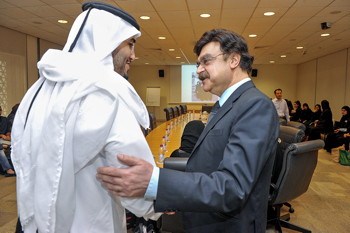
Sheikh chats with Abdulwahed Zainel '14 at a recent reunion event for members of WCMC-Q's foundation program. Photo: Weill Cornell Medical College in Qatar. See larger image
How has the distance between the college and New York influenced the way WCMC-Q has developed?
It is, of course, a challenge to be so far from Ithaca and New York City, but it also presented us with a great opportunity to become pioneers in the use of digital technologies. The vast majority of our learning materials are digital and accessed through our distributed e-library facility, which contains more than 17,800 e-books and more than 8,000 e-journals. We also have live video feeds piped to big screens in our lecture halls that allow our students to participate in lectures taking place in Ithaca and New York.
Our location in the heart of the Middle East has endowed us with a very cosmopolitan student body, which has given us a unique identity. We draw on the cultural values of our region, where learning and intellectual curiosity has been revered since ancient times, and on the forward-thinking, innovative approach to technology that characterizes medicine in the United States. This combination of cultures gives our students a very strong foundation upon which to build their careers in medicine.
How do you see the college's role in Qatar's health care system?
We see our role as central to the development of the country's health care system, and we take our responsibility to the people of Qatar very seriously. We are working closely with the Supreme Council of Health, the body responsible for implementing health policy in Qatar, and our partners at Hamad Medical Corporation (HMC), the national health care provider, to help formulate policy and create a regulatory framework to meet the health care goals set out in Qatar's National Vision 2030 document. We are also working with the Supreme Council of Health, HMC and Sidra to develop Qatar's Academic Health System, which will integrate clinical care with education and research.
What is the college doing to address public health in the Middle East?
The region, like many parts of the world, is suffering an obesity and diabetes crisis, mainly due to poor lifestyle choices. Related to these are complications such as heart disease, stroke, kidney and liver disease and certain forms of cancer. Our commitment to the public health of people in our region means that we tackle these issues in a number of ways. First, we are producing a new generation of doctors trained to treat these diseases. Second, we are conducting research into better ways to treat, manage and prevent the diseases, and we have had encouraging breakthroughs of late, particularly in the fields of diabetes care and breast cancer treatment. Third, we have launched a five-year public campaign called Sahtak Awalan, which means "Your Health First" in Arabic, to encourage people of all ages to adopt healthier lifestyles and take responsibility for their own well-being.
How do you relax?
I like to read books on the history of ideas and discoveries that provide me with a much-needed perspective on the remarkable progress of humanity during the last millennium and add to my optimism for such progress to continue in the future. I find that very relaxing and rejuvenating.
The deanDr. Javaid I. Sheikh, dean, Weill Cornell Medical College in Qatar At WCMC-Q since: April 2007 Serving as dean since: January 2009 (as interim dean; dean since January 2010) Areas of expertise: anxiety disorders, chronic stress-related conditions and cognitive impairment. Weill Cornell Medical College in QatarPopulation: 67 teaching faculty, 284 students School's major areas of future growth: Continued growth of research program, with particular focus on diabetes, cancer and genetic medicine. A new laboratory was recently dedicated to the development, application and data analysis of genomic technologies. Faculty recruitment is focused on translational/clinical research, diabetes research and epidemiology. |